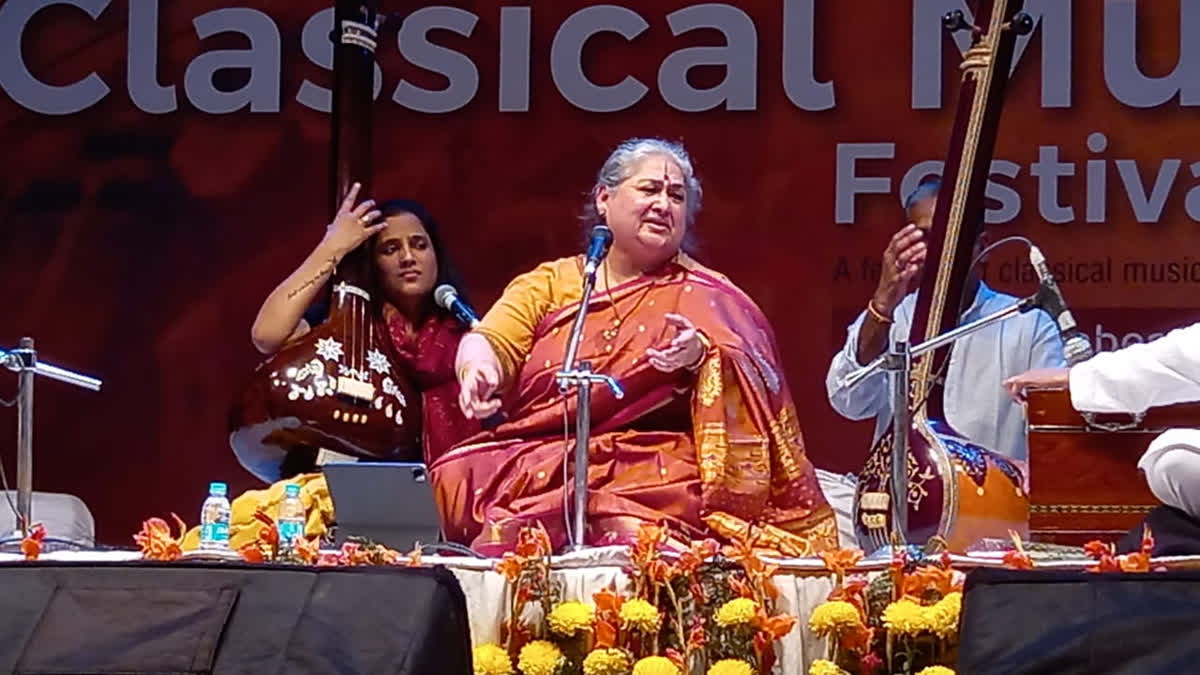New Delhi: “Music is a language that speaks to all,” says Shubha Mudgal, whose unforgettable hits like Ab Ke Sawan and Ali More Angna have transcended genres and generations. In an exclusive conversation with ETV Bharat, the songstress opens up about her artistic journey, experiments with fusion, and her enduring passion for music.
Fusing Classical with Pop: A Bold Experiment
“I never thought I’d merge classical music with pop,” she admits. Trained rigorously in Indian classical music, Shubha initially focused solely on this rich tradition. But when the opportunity to experiment with pop arose in the 1990s, she embraced it wholeheartedly.
“It was a way to present my experiences and emotions to listeners in a different way,” she explains. The result was a series of tracks that captured the imagination of a generation, offering both the sophistication of classical music and the accessibility of pop.
Songs like Ab Ke Sawan and Ali More Angna became instant hits, cementing her position as a versatile artist who could appeal to purists and casual listeners alike.
'Music Is Always Sweet'
Today, the music world is more diverse than ever, with genres like hip-hop, EDM, and fusion reshaping the landscape. Shubha sees this as an evolution rather than a departure. “Music is always sweet, no matter what form it is in,” she says. “It all depends on what listeners connect with. Each genre has its beauty, and I believe there’s room for all of them to thrive.”
For Shubha, this philosophy is reflected in her diverse body of work. From lending her voice to television serials like Diya Aur Baati Hum to performing at prestigious classical music festivals, she continues to explore and celebrate the vast possibilities of music.
Awards and Accolades
Shubha’s contributions to music have not gone unnoticed. In 2000, she was honored with the Padma Shri by the Government of India, recognizing her efforts to bring classical music to a broader audience. She has also received the Gold Plaque Award for Special Achievement in Music at the Chicago International Film Festival and the Yash Bharti Award from Uttar Pradesh in 2015.
“These awards are a reminder of the responsibility I have as an artiste,” she says. “They motivate me to keep experimenting and reaching out to my listeners.”
A Magical Evening in Delhi
On December 5, the third and final day of a classical music festival at Shriram Center in Delhi, Shubha took the stage to perform for an audience of avid art lovers. Her performance, like always, was a spellbinding blend of technical mastery and emotional depth.
“It’s always special to perform in Delhi, where the audience truly appreciates the nuances of classical music,” she shares.
Balancing Tradition and Modernity
While Shubha has been a trailblazer in experimenting with genres, her roots in classical music remain her anchor. “Classical music is my foundation,” she says. “It gives me the strength to explore other forms without losing my identity.”
Her ability to bridge these worlds has made her an enduring icon in Indian music. Whether she’s performing a thumri or belting out a pop anthem, Shubha Mudgal’s voice carries the same unmistakable depth and sincerity.
Looking Ahead
When asked about the future of music, Shubha is optimistic. “There’s so much talent out there, and the ways to share music are more diverse than ever. I hope to keep learning, collaborating, and connecting with audiences in new ways.”
As her fans would say, Shubha Mudgal’s music isn’t just something you hear—it’s something you feel. Whether it’s the soulful strains of Piya Tora Kaisa Abhimaan or the joyous exuberance of Ab Ke Sawan, her art continues to resonate, bridging the past and the present in a way that few can match.



